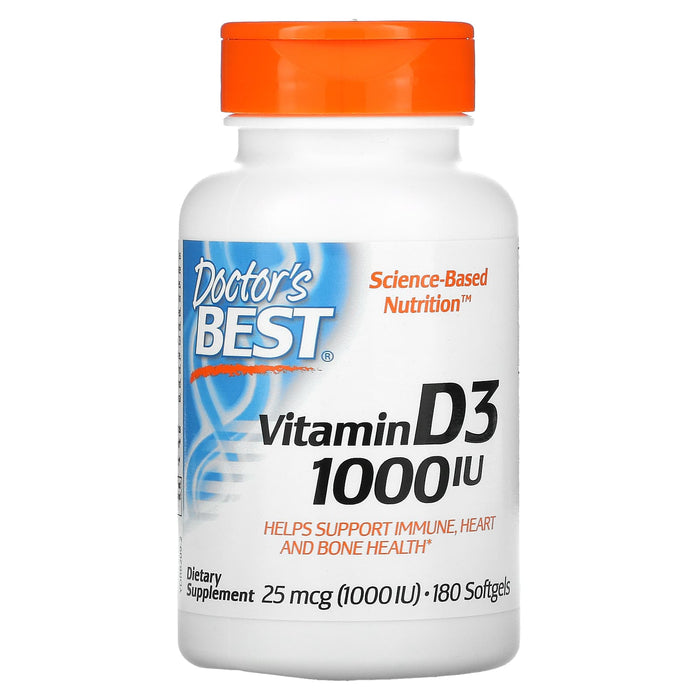




| Serving Size: 1 Softgel | ||
| Servings Per Container: 180 | ||
| Amount Per Serving | % Daily Value | |
| Vitamin D3 (as cholecalciferol) |
25 mcg (1000 IU) |
125% |
Maintain optimal vitamin D levels with Doctor's Best Vitamin D3, a crucial nutrient for overall health.
Doctor's Best Vitamin D3 provides cholecalciferol, the form of vitamin D3 needed for the body to regulate calcium and phosphorus levels for healthy bones, teeth, and heart. This essential vitamin, produced in the skin through UV ray absorption and obtained in limited amounts from food, supports immune function, cardiovascular health, bone density and structure, and cellular function.
Adult use: Take 1 softgel daily with food, or as recommended by a nutritionally informed physician.
Extra virgin olive oil, softgel capsule (gelatin, glycerin, purified water).
Store in a cool dry place.
At Health Orchard, we are committed to providing accurate product information and images. However, manufacturers may update their product packaging or ingredients, and these changes may not be immediately reflected on our website. It's possible for products to be shipped with different packaging than what is shown online. For the most accurate and safe use of any product, we advise reading the product's label, warnings, and instructions rather than relying solely on the details provided by Health Orchard.
Yes, it is generally considered safe and often beneficial to take vitamin D3 daily, especially for those who have limited sun exposure or are at risk of deficiency. Vitamin D3 is essential for calcium absorption, bone health, immune function, and various other bodily processes. However, the appropriate daily dose can vary based on individual factors such as age, weight, and current vitamin D levels.
Doctors typically don't recommend specific brands but rather focus on the form and dosage of vitamin D. Many healthcare professionals prefer vitamin D3 (cholecalciferol) over D2 (ergocalciferol) due to its better absorption and utilization in the body. Reputable brands that use high-quality ingredients and undergo third-party testing, such as Doctor's Best, are often considered good choices.
The recommended daily intake of vitamin D3 can vary depending on age, health status, and individual needs. Generally, for adults, the recommended dietary allowance (RDA) is 600-800 IU (15-20 mcg) per day. However, many healthcare professionals suggest higher doses, particularly for those with deficiency or at high risk, sometimes recommending 1000-2000 IU or more daily.
Vitamin D3 (cholecalciferol) is generally considered superior to vitamin D2 (ergocalciferol). Vitamin D3 is the form naturally produced in human skin in response to sunlight and is more effective at raising and maintaining vitamin D levels in the body. It has been shown to be more potent and longer-lasting than vitamin D2, making it the preferred form for supplementation in most cases.
When taking vitamin D3, it's important to avoid excessive intake of vitamin A, as high levels of both vitamins can lead to toxicity. It's also advisable to be cautious with calcium supplements, as vitamin D enhances calcium absorption. Some medications, such as certain cholesterol-lowering drugs or weight loss medications, may interfere with vitamin D absorption, so timing of these should be considered.
The best form of vitamin D3 is typically considered to be cholecalciferol, which is identical to the form produced in the human body in response to sunlight. For supplementation, vitamin D3 in oil-based softgels or liquid form is often preferred due to potentially better absorption, as vitamin D is fat-soluble. Some formulations also include vitamin K2, which works synergistically with vitamin D3 for optimal calcium utilization.